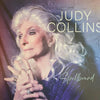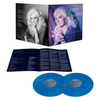



Judy Collins - Spellbound (2LP, Blue vinyl)
ORDER LIMITED TO ONE ITEM PER CUSTOMER
Lead Vocals, Guitar– Judy Collins [click here to see more vinyl featuring Judy Collins]
12-String Acoustic Guitar – Judy Collins (C1)
Piano – Judy Collins (A1-3, A5, B2, B4, C2-3, D1)
Guitar, Vocals – Dave Wilson
Mandolin, Vocals – John Teer
Bass, Vocals – Greg Readling
Guitar – Jonas Fjeld
Piano, Keyboards – Russell Walden
Drums – Bill Berg
Banjo – Chandler Holt
Acoustic Guitar – Ari Hest (A1-4, B1, B2, B4, C1-2)
Acoustic Guitar, Electric Guitar, Pedal Steel Guitar, Baritone Guitar – Thad DeBrock (A1-4, B1-2, B4, C1-3)
Cello – Dave Egger (C2)
Drums, Percussion – Doug Yowell (A1-C3)
Electric Bass – Tony Levin (A1, C3)
Electric Bass, Electric Upright Bass – Zev Katz (A2-C2)
Electric Guitar – Gerry Leonard (A5, B3)
Arranged by Russell Walden
Vocals arranges by Ari Hest (A1)
Strings arranged by Dave Egger (C2)
Written by Judy Collins
2 LPs, gatefold jacket
Limited edition
Original analog Master tape : YES
Heavy Press : 180g Virgin Vinyl
Record color : Translucent Red
Speed : 33 RPM
Size : 12'’
Stereo
Studio
Record Press : unspecified
Label : Cleopatra
Original Label : Cleopatra
Recorded 2016–2022 at Echo Mountain Recording
Engineered by Dowell Gandy
Judy Collins' Vocals recorded, produced and mixed by Alan Silverman
Mixed by Mike Tierney, Paul Rolnick at Arf! Mastering
Produced by Judy Collins, Alan Silverman, Russell Walden
Mastered at Arf! Mastering
Originally released in February 2022
Reissued in August 2022
Tracks:
Side A
- Spellbound
- Grand Canyon
- So Alive
- Hell on Wheels
- Shipwrecked Mariner
Side B:
- When I Was a Girl in Colorado
- Thomas Merton
- Wild with Mist
- Gilded Rooms
Side C:
- Prairie Dream
- City of Awakening
- Arizona
Side D:
- The Blizzard
- Slow Burn
- In the Twilight
- Mountain Girl
Reviews :
Judy Collins turns 83 this May but still has that same pure crystal mountain stream quality to her voice that she did when she recorded things like Amazing Grace and Farewell To Tarwathie back in 1970. Making her debut in 1961, in the past 60 years, she’s released over 40 albums, but, astonishingly, while she’s recorded self-penned numbers before, Spellbound is the first to feature exclusively her own material, written over the course of the last two or three years, some inspired by the pandemic enforced silences between concerts, pretty much all of them couched in memories of her younger days.
Dedicated to early influences Pete Seeger and Woody Guthrie who, she says “sang me alive”, it features Collins behind the piano, Zev Katz on bass, multi-instrumentalist Thad DeBrock, drummer Doug Yowell and Ari Hest on guitar and harmonies. The album opens with the drone and fluttering piano notes of the title track Spellbound, written on a windy day in Honolulu in 2020 as she stared out of the hotel window and, lost in the reverie of an old love, recalls “Dark dreams, haunted sunlit days/While I drank down rum and hope/Burning dreams and crimson lovers”.
Voice soaring on her distinctive wings, she’s found staring out of a different window at a different view on Grand Canyon (“Outside my window lies the canyon/Red and turquoise, orange and blue/Wandering through the painted desert/Like some bewildered drunken fool”), a recollection of the years spent in Colorado between the ages of nine to twenty-one, working on mountain ranches, riding horses, hanging out with cowboys and hiking in the Rocky Mountain National Park. The specific inspiration was Dick Barker, who ran float trips down the Snake River in Wyoming (“He was hard about his work/Soft about the columbines/Spoke about Apache friends/Missed the years of silver mines”) and sang the first cowboy folk songs she ever heard, pondering “Is he still alive and smiling/Through a hazy waterfall/Sometimes I think it was madness/To have left his lonesome call/To sail beyond the canyon wall”.
Her immersion in the 1960s folk explosion of Greenwich Village is the touchstone for So Alive, what sounds like cascading harp notes behind the piano runs as she recalls “Singing at The Bitter End under all those lights/Making love in single beds, you always left by dawn/Climbing on the Greyhound bus, where you would be alone/ Singing in MacArthur Park, singing in Cheyenne/Singing in the wilderness where the truth began/We were gypsies in the wind, yearning just to fly/Making music, making love as the years went by”. It’s a reminder that, in her youth, Collins was actually a bit of a bohemian wildcat (“I found my peace in whiskey and the poets of the past”), singing folk songs and dreaming of rock and roll. It’s that seventeen-year-old that stalks Hell on Wheels which, in relative terms, is the album’s rock out track with its driving uptempo rhythm, recalling how she drove from Grand Lake to the Devil’s Thumb Ranch in the little valley town of Tabernash (“in my cowboy boots and my Levi’s/Hair hanging down my back/Drivin that ‘53 Chevy/Rolling down that mountain track”) to see a friend and ending up driving drunk and crashing (“Saw two little children sitting in the dirt/Missed them by a mere few feet/Their arms reaching out for daddy/That nightmare still plays in my sleep”), the song carrying a sobering message that “You always think you’re in control/Someday you realize/You’re hell on wheels/And you know you have to go slow”.
She returns to a more sedate feel for the ethereal folk and watery piano notes of Shipwrecked Mariner, a ‘love on the rocks’ number drawn from several personal experiences (“when the storms came down upon our dream/You said I’d got it wrong and we would drown/I should have seen the shipwreck in your eyes”), but also about how these also “gave me all the strength I need to stay alive”.
It’s back to her youth for the steady strummed folksy rhythm of When I Was A Girl in Colorado, a song about her deep connection to its landscape, the symbiosis of yearning and creativity and the sense of freedom and completeness it inspires (“I could conquer anything/I could fly with wings of silver/I could whisper, I could sing”).
People, as well as places, provide the springboard, the traditional folk hues of Thomas Merton a tribute to the author, a Trappist monk who spent most of his adult life in a monastery in Gesthemani on the outskirts of Louisville and was a vocal campaigner against the Vietnam war (“He saw all wars were evil/And the devil was the dancer”), the song concerning speculation that his death in Thailand (“the story was that he had died/Stepping from the bath/Shocked by the electricity/That lay there in his path”) may have been murder (“Upon his death concealed/The evidence of bullet holes/Finally was revealed”).
Closer to home, Prairie Dream draws on her father’s roots with the Nez Perce Reservation in Idaho where he was born and, while Irish-English rather than American Indian, he took to heart the cause of the tribe and Chief Joseph and passed down to his daughter the desire for justice for their treatment and that of the Sioux, Comanches, Cherokee and Arapahoe by the American government (“Starving in their trails of blood and sorrow/Ancient creatures innocent of crime/Manifest in destiny they flounder/Like the wandering footsteps of the blind”).
Art too serves as inspiration, Wild With Mist stemming from a visit to the Tate Gallery with her husband to see the Turner collection and being caught up in the worlds he captured, to “wander through the softly spreading sunlight/Into another, and then another world/Seeing the heads of whales/Seeing the ships of night/Sighting places where Turner went to paint/Slipping into deep waters, to worlds much travelled” as well as mention that “in his fine black hat and unclouded eye” he “had a lover in a little sea-swept town near London”.
She returns to 1962 for Arizona, the year she recorded her second album, Golden Apples of the Sun, but her marriage was falling apart, she was drinking too much and, after her set at a club in Tucson, was taken to hospital where she was diagnosed with tuberculosis. The song isn’t about that; instead, it’s an evocative portrait of the desert state “of starlight and tumbleweed/Where antelope climb the ravine” and which “healed all the wounds that were hidden” and of her emerging back into the lights (“My dark years are gone and the old dreams move on…That none of the magic is done/That everything sings and moves on/And all that’s forgiven is gone”.
The (official) remaining two songs are both love letters to the city. Tinted with minstrel colours, Gilded Rooms harks back to hanging out in the folk singer-songwriter scenes of late 60s London, New York and Newport, of who will “ride off on the shining horse and who will stay the course”, and though it’s open to teasing speculation as to who she is referring to in lines like “She learned to sing and paint in her own blood/As it dripped upon the strings of her guitar/She found a blade of steel in the silver flood/And tore her friends and fingernails apart” and “They met when he was thirty years of age/Already at his peak and at a loss/Joan of Arc had crossed his path so early/And he had borne the dagger and the cross”, it’s tempting to find allusions to Baez, Dylan and Cohen.
Caressed by cello, the dreamy lullaby City of Awakening is also about New York, a love letter to her home for nearly sixty tears, “The village with its scrambled streets and lovers’ lanes the long lost rooms on Perry Street where love was slain” and a faith in its ability to emerge from the pandemic (“Stripped of roaming figures, you are still alive/You will blossom, you will win, you will survive”), bringing the album to a luminous close as her voice soars to the skies.
Well, not quite; there’s also a bonus track, The Blizzard, a shimmering number specifically written to sing at a brace of Christmas concerts in 1989 in Aspen with Kris Kristofferson and a television special featuring her entire family. Not having a song about Colorado, she wrote this while stuck in a snowstorm in Connecticut in November. The lyric talks about taking refuge in a diner and getting into a conversation with a stranger and opening up about the lover from Spellbound who had broken up with her (“I’m a private sort of person, but a blizzard is a blizzard/And somehow I found myself saying you’d left me/Tellin’ him everything I wanted to say to you”) and he responding “You must know, you’re too good for him… Here have a little whiskey, pretend you don’t give a damn”. A song about the compassion of strangers and how, “There’s a light in the window and a place called home/At the end of the storm”, it ends with the sun rising over her heart as she sings “Then I knew that I would get over you, knew you could leave me, but you’d never break me”.
Invested with reflections and memories, it’s quite literally an album of a lifetime that, spurred by a pandemic that put life on hold, has equally taken almost a lifetime to find its purpose in coming into existence. There have been very few upsides to lockdown. This late career-high is indisputably one of them. It will indeed hold you spellbound.” Mike Davies, Folk Radio, February, 2022
Ratings :
Discogs : 4.75 / 5


